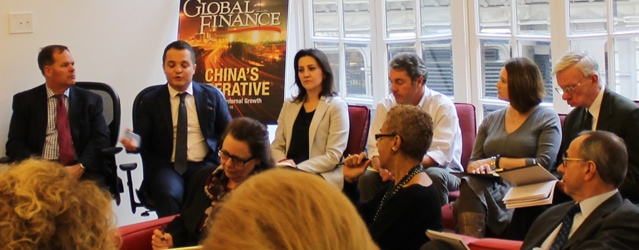Despite political turmoil in the wake of last summer’s coup attempt, it’s business as usual, according to executives at multinationals.

From time to time the Turkish government sends a delegation of business leaders to drum up corporate interest in investing in the nation. The last time they swung through Global Finance’s Manhattan offices was in 2013.
This year, however, has been a little different. “We do this all the time,” said Canan M. Özsoy, president and CEO of GE Turkey. “This time, there are some added thrills to the questions we are getting.”
Of course, the group was not on tour to address questions raised by the government’s ongoing post-coup crackdown. Instead, an impressive lineup of top-ranking Turkish executives at multinational corporations—GE’s Özsoy, along with Serra Akçaolu of Citi; Murat Kansu, of Microsoft; hsan Necipolu, of Dow; Cenk Kivilcim, of Cisco; Tankut Turnaolu, of P&G; Aysegül Aydin, of executive recruiter Heidrick & Struggles; and smail Esin, of law firm Baker & McKenzie—joined with leaders of key local enterprises such as Mahmut Ünlü, of investment bank and asset manager Ünlü & Co, and Arda Ermut, president of the Turkish investment support and promotion agency Ispat, to remind potential investors of Turkey’s inherent benefits as an investment destination and its history of stable economic growth.
“We only get 1% of global FDI [foreign direct investment],” said Ermut, president of Ispat. “We believe it should be more like 1.5% or 2%.” Akçaolu, Citi’s country chair for Turkey, described the current $17 billion annual trade with the US as “not up to the potential of the relationship.” Europe supplies two-thirds of Turkey’s inbound FDI. Necipolu of Dow added, “I’m not happy about our growth. We can grow twice as much. But only if international investors come and trade increases.”
“Our strengths are in three fundamentals: geographic position, a young population and strong growth,” outlined Akçaolu. Turkey’s location as a fulcrum between East and West has shaped a flexible cultural outlook, and its young population adapts easily. The nation’s economic growth, meanwhile, has historically been strong and steady.
Talent In The Sweet Spot
Ermut, of Ispat, says Turkey’s location gives its citizens a two-sided cultural understanding that is useful in business: “You can send a Turk to negotiate in an Islamic country in the morning and then to Europe to do business in the evening.” P&G, for example, counts Turkey as part of Europe—in part because its legislation is harmonized with the EU, according to Turnaolu—although 80% of what it makes in Turkey is designated for the Turkish market.
Microsoft takes advantage of Turkey’s role as a bridge, managing operations for 80 nearby countries from its Turkish headquarters in Istanbul. “We have huge confidence in the country and will make no changes in response to recent events,” said Kansu, general manager of Microsoft Turkey. “It’s an energetic technology market, and a key reason is talent.” He praised the universities, adding that Microsoft is working with start-ups—some 1500 so far—but said he doesn’t see US companies coming in and taking advantage of the entrepreneurial mind-set in the same way as Europeans.
Indeed, a robust high-end labor market was repeatedly cited as key to Turkey’s appeal. For Cisco, which expects Turkey’s domestic market to hit $80 billion by 2023, the smart, tech-savvy population is a test lab. “They adapt to technology very quickly,” said Kivilcim, general manager of Cisco Turkey. “So we try new technology there, and then replicate it elsewhere.”
Recruiting for top posts is a specialty of Aysegül Aydin, founding and managing partner for Heidrick & Struggles Turkey. “Over the years we have watched Turkey becoming international, exporting talent around the world,” she said. “Europe has aged. Their skill set is very old-school—not open to learning, not practical, extremely slow. The Middle East isn’t better—it’s even much worse. In Turkey, executive candidates are fast-learning, entrepreneurial and open to sharing.”
None of these business leaders are ignorant of the turmoil surrounding them. “We have challenging neighbors,” said Akçaolu, acknowledging at once both refugees coming from the east and antipathy to refugees from the West. They know that total FDI will be less in 2016 than the year before. But Ünlü says that’s merely because many investors waited to see how the coup would play out. “A lot of the deals that would have closed by the end of this year will now close in early 2017 instead,” said Ünlü.
What’s the current state of affairs, in sum? It’s partly a matter of perspective. “Companies or people not doing business with Turkey have a more negative view than those who do,” said Aydin, the executive recruiter. These leaders have survived turmoil before—“we Turks are global crisis management experts,” quipped Özsoy—and expect the country to emerge stronger. “The word we like to describe ourselves,” said Akçaolu, “is ‘resilient.’”



